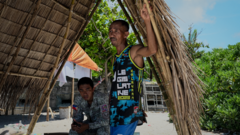After spending nearly 15 years on death row in Indonesia, Mary Jane Veloso has been released and is on her way back to the Philippines. Convicted for carrying heroin, she maintained her innocence, claiming she was deceived into smuggling drugs. Her return follows an agreement between the two governments, allowing her a chance at a new life.
Filipino Woman Freed After 15 Years on Death Row in Indonesia

Filipino Woman Freed After 15 Years on Death Row in Indonesia
Mary Jane Veloso, who was sentenced to death for drug trafficking, has finally returned home to the Philippines, marking the end of a harrowing 15-year ordeal.
A woman who once faced execution in Indonesia is finally heading home to the Philippines after spending close to 15 years on death row. Mary Jane Veloso, a 39-year-old mother of two, was sentenced to death in 2010 for carrying 2.6 kilograms (5.7 pounds) of heroin at an airport in Indonesia. Throughout her trial and imprisonment, Veloso has continually asserted that she was tricked into becoming a drug mule.
On Tuesday evening, Philippine officials welcomed Veloso after a diplomatic agreement facilitated her return. "This is a new life for me and I will have a new beginning in the Philippines," she expressed at a news conference, where she expressed her desire to reunite with her family in time for Christmas. "I have to go home because I have a family there, I have my children waiting for me," she highlighted.
Mary Jane Veloso's troubles began in April 2010 when she was detained at Yogyakarta airport. She contended that she had been misled by a friend of her godmother, who persuaded her to travel to Indonesia under the pretext of employment as a maid. Unbeknownst to her, the clothing and bag given to her by the woman's acquaintances were laced with heroin.
In 2015, Veloso narrowly escaped execution as Philippine officials secured a last-minute reprieve; this occurred following the arrest of the woman accused of recruiting her, leading to Veloso being identified as a key witness in a related human trafficking trial.
Her plight resonated deeply within the Filipino community, given the prevalence of women seeking work abroad as domestic helpers to escape poverty. Veloso’s story garnered significant sympathy, especially in a country that does not endorse the death penalty.
As she departed from prison, Veloso carried personal items from her time inside, including a guitar and books, expressing her readiness to embrace freedom. Her return coincides with the repatriation of other Filipino prisoners, underscoring growing diplomatic efforts between the Philippines and Indonesia regarding their citizens incarcerated abroad.


















